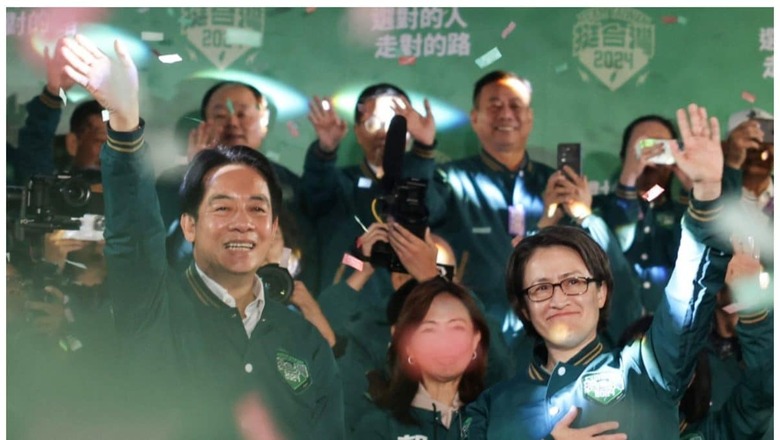
views
Taiwan’s ruling Democratic Progressive Party’s William Lai Ching-te is all set to become the country’s new president after defeating the opposition party, Kuomintang’s Hou Yu-ih in the polls.
The president-elect Lai Ching-te vowed on Saturday to stand “on the side of democracy” and fight for the self-ruled island against “intimidation” from China.
Following a strong campaign for the Democratic Progressive Party (DPP) in which he presented himself as defender of Taiwan’s democracy, Lai delivered an unprecedented third consecutive term for the party.
Lai thanked the Taiwanese people for “writing a new chapter in our democracy”, after his victory defeating his two opponents.
The victory extends DPP’s rule after eight years under outgoing President Tsai Ing-wen, who had served the maximum two four-year terms.
His main rival Hou Yu-ih of the opposition Kuomintang (KMT) trailed in second place with 33.5 percent.
Communist China claims democratic Taiwan, separated from the mainland by a 180-kilometre (110-mile) strait, as its own and says it will not rule out using force to bring about “unification”, even if conflict does not appear imminent.
Earlier, Beijing has in the slammed Lai, as a dangerous “separatist” and on the eve of the vote, its defence ministry vowed to “crush” any move towards Taiwanese independence.
“We are telling the international community that between democracy and authoritarianism, we will stand on the side of democracy,” he said, adding that he will also try to pursue exchanges with China.
“I will act… in a manner that is balanced and maintain the cross-strait status quo,” he said.
But he also vowed “to safeguard Taiwan from continuing threat and intimidation from China”.
The election was watched closely by both Beijing and Washington, Taiwan’s main military partner, as the two superpowers tussle for influence in the strategically vital region.
China’s Threats On Taiwan
Located on a key maritime gateway linking the South China Sea to the Pacific Ocean, Taiwan is home to a powerhouse semiconductor industry producing precious microchips — the lifeblood of the global economy powering everything from smartphones and cars to missiles.
In the recent years, China has stepped up military pressure on Taiwan, periodically stoking worries about a potential invasion.
Chinese President Xi Jinping said in a recent New Year’s address the “unification” of Taiwan with China was “inevitable”.
Chinese warplanes and naval ships probe Taiwan’s defences almost daily and Beijing has also staged massive war games in recent years — simulating a blockade of the island and sending missiles into its surrounding waters.
The Chinese military said the night before the polls that it would “take all necessary measures to firmly crush ‘Taiwan independence’ attempts of all forms”.
(with AFP inputs)


















Comments
0 comment